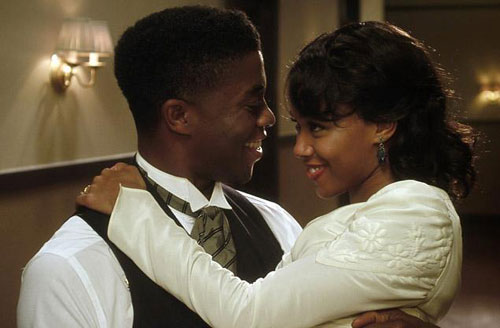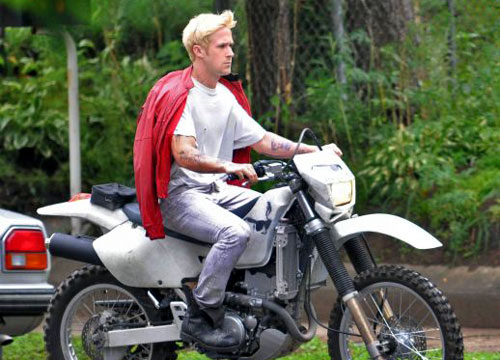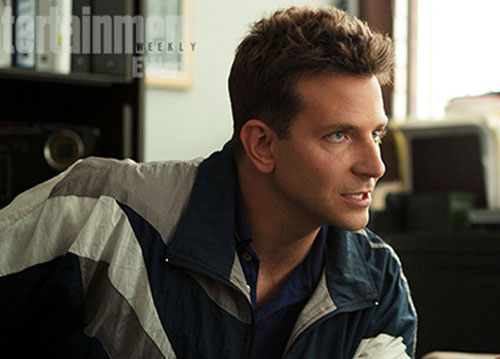|
Brian Helgeland's 42 is an old-fashioned baseball movie in the tradition of Pride of the Yankees and The Babe Ruth Story. For that matter, 42 is in the tradition of The Jackie Robinson Story, the 1950 film in which Robinson played himself. Since then, actors such as Andre Braugher, Blair Underwood and David Alan Grier have played Robinson. In 42, Robinson is played by Chadwick Boseman, who gives a solid, respectable, traditional performance in a solid, respectable, traditional film.
Jackie Robinson's story, of course, was a milestone both for American sports and for American race relations. Branch Rickey (Harrison Ford), general manager of the Brooklyn Dodgers, sought the publicity of signing the first black player in major-league baseball, but he also was a devout, idealistic Christian who believed in the elemental fairness of integrating the game. For decades Rickey had seen the pervasiveness of racism in baseball, and he loathed it. But neither he nor Robinson was under any illusions about what was in store. "Your enemy will be out in force, and you cannot meet him on his own low ground!" Rickey warns Robinson at the beginning of the film.
Robinson soon found that he had plenty of enemies on his own team, never mind in the bleachers. Fortunately, one exception was shortstop and Kentuckian Pee Wee Reese (Lucas Black), whose public show of friendship for Robinson was a major factor in Robinson's acceptance by white fans.
Rickey's consistent advice to Robinson was to turn the other cheek, and it was sound—if galling—advice in the days of Jim Crow. Robinson's biographers have pointed out that turning the other cheek did not come naturally to him. Helgeland's screenplay tells us this at the beginning, but tends to downplay it in the course of the film. Unfortunately, this flattens out Robinson's character as written, making him too much of a standard-issue movie paragon. Boseman, however, is never less than engaging as Robinson, and the camera loves him. The same can be said of Nicole Beharie, who plays Robinson's loyal wife, Rachel.
 |
Some reviewers have complained that 42 plays fast and loose with the facts of Robinson's life and career. If true, that is not exactly unusual in any film biography. However, the film's most horrifying set piece—the barrage of racist insults unleashed by Philadelphia Phillies Manager Ben Chapman during a Dodgers-Phillies game—is absolutely true. Alan Tudyk forgoes his usual goofy-lovable image here, masterfully playing a character everyone in the audience will want to beat up in the parking lot. (The real Chapman, if anything, was even worse than Tudyk plays him. Look him up, if you have the stomach for it.)
Directorially, 42 is competent and squarely built. It looks sensational, thanks to the meticulous late-1940s recreations by production designer Richard Hoover and costume designer Caroline Harris. The acting is good throughout: Christopher Meloni is notable as Dodgers Manager Leo Durocher, a man with problems of his own, as is Andre Holland as Wendell Smith, who did for sportswriting what Robinson did for baseball.
However, the MVP of 42—indeed, the overriding reason to see the movie—is Harrison Ford's Branch Rickey. Relishing his reprieve from having to play the action hero, Ford hams it up in the best possible sense of the phrase, channeling his inner Lionel Barrymore. Ford's Rickey is the Dodgers' wise grandfather, twinkly and folksy most of the time, stern when he needs to be. One of his best scenes is the one in which Pee Wee Reese comes to him, worried about a poison-pen letter he has just received. With a flourish, Rickey produces three fat manila folders, containing the hate mail Robinson has received.
42 is an old-fashioned movie in every way, telling a story that cannot be retold often enough. In contrast, Derek Cianfrance's The Place Beyond the Pines is distinctly bravura filmmaking. Its story, however, is as old as the Bible, with the fathers eating sour grapes and the sons' teeth being set on edge. In its structure, it reminded me of the big, sprawling 1970s miniseries based on big, sprawling 1970s novels—The Thorn Birds, Rich Man, Poor Man, Captains and the Kings.
Far too many reviewers of The Place Beyond the Pines described the plot in detail. This is a shame, because The Place Beyond the Pines needs to catch you by surprise with its characters' twists of fate. This is what I knew going in to the movie: that Ryan Gosling and Bradley Cooper played antagonistic characters on opposite sides of the law, and that the story took place over a number of years.
 |
This is what I feel safe telling you: Gosling's Luke Glanton dominates the first half of the movie, and Cooper's Avery Cross the second half, though there is also important business in the film's last third involving Avery's son A.J. (Emory Cohen) and Luke's son Jason (Dane DeHaan). Luke, a daredevil motorcyclist, turns to bank robbery to support his illegitimate infant son; he is a creature of sensation and impulse, thinking of nothing except his needs of the moment. Avery, a policeman and son of a state Supreme Court judge, is Luke's polar opposite: deliberative, ambitious, almost painfully moral, a political animal yet wracked with guilt.
 |
To say how Luke and Avery's lives intersect is absolutely no fair. It's OK, however, to talk a little about the relationship between the teenagers A.J. and Jason. A.J. is a selfish, drug-addled twerp reminiscent of another fictitious A.J. (Soprano). Jason is almost as messed up as A.J., though for various reasons he is much more sympathetic. They become acquainted because A.J. assumes, correctly, that Jason knows where to score drugs. They begin a friendship that soon deteriorates into open animosity, especially after Jason discovers a certain fact about A.J.
In contrast with Helgeland, Cianfrance has a dazzling directorial style, almost Wellesian in its assurance. The opening sequence is an unbroken tracking shot of a heavily tattooed Luke suiting up for his nightly performance at a carnival, then swaggering his way through an admiring crowd to take his place in the "Cage of Death." It is every bit as amazing as Welles' opening shot in Touch of Evil. At great as that sequence is, Cianfrance almost tops it with another scene toward the film's middle, a jittery chase scene between Luke on his motorcycle and a squad of patrol cars.
The screenplay by Cianfrance, Ben Coccio and Darius Marder isn't particularly well-made, and a lot of plot threads go dangling. Nevertheless, the story has a cumulative emotional power that approaches Dreiserian levels. If only the dialogue matched the story. In a recent essay, Sir Ben Kingsley lamented the decline of language in contemporary drama. "'To be or not to be' would now be, 'What the fuck?'" he wrote. "And that would be it." While some readers might consider this disingenuous coming from the man who once spoke the onscreen line, "I'm sweating like a cunt," Kingsley's point is sound—particularly in the context of The Place Beyond the Pines. Far too much of the dialogue consists of, "Fuck you—No, fuck YOU!" exchanges. While most of the characters in The Place Beyond the Pines could be expected to talk like that, it gets monotonous.
All four lead actors distinguish themselves, though Gosling and DeHaan have the most compelling roles. They are matched by Eva Mendes, as the love of Luke's life and Jason's mother; Ray Liotta, as Avery's corrupt superior in the police department; Rose Byrne, as Avery's supportive but bewildered wife; and Harris Yulin, as Avery's politically savvy father. Deserving special mention is Ben Mendelsohn as Robin, Luke's best friend and partner in crime. The easygoing Robin suggests, to an initially reluctant Luke, that the occasional bank robbery is a good way to solve cash flow problems. Robin's lazy good nature, however, soon turns to horror at the monster he has created.
The Place Beyond the Pines is not a perfect movie, but it is undeniably a powerful one. Though possessing relatively few characters and a not particularly big budget, it is a big movie, in the way The Godfather was big. In these days of the domination of silly romcoms and Fall Down Go Boom, it's nice to have a long, character-driven narrative to get lost in.
|